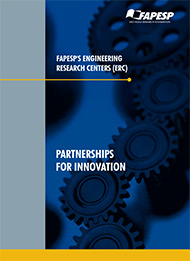Urbano Ernesto Stumpf Engineering Research Center seeks new partners

30 de novembro de 2017
By Elton Alisson | Agência FAPESP – The Professor Urbano Ernesto Stumpf Engineering Research Center, organized by and with the support of FAPESP and PSA (which owns the Peugeot, Citroën and DS brands), is pursuing new partnerships with automotive manufacturers interested in developing solutions designed to enhance energy efficiency and reduce carbon dioxide (CO2) emissions via the use of engines powered by biofuels.
The Center’s activities, key research results and new opportunities for collaboration were presented to representatives of vehicle and auto parts manufacturers at an event held on November 28, 2017, in FAPESP’s auditorium.
Launched in 2014, the Center’s mission is to conduct precompetitive research on ways and means of upgrading biofuel engines.
Its first project, scheduled for completion in October 2018, was a concept study of an advanced ethanol engine that would make more cost-effective and energy-efficient use of the biofuel.
The project is being conducted by researchers affiliated with the University of Campinas’s Mechanical Engineering School (FEM-UNICAMP), the University of São Paulo’s Engineering School (POLI-USP), the Aeronautics Technology Institute (ITA) and the Mauá Technology Institute (IMT).
“The flex-fuel engines in use today in Brazil are a compromise solution. In the past they ran on gasoline and now mostly run on sugarcane ethanol, but even so their design is a compromise. The idea now is to develop a dedicated ethanol engine, which could have highly interesting characteristics considering the limitations of gasoline,” said Waldyr Luiz Ribeiro Gallo, a professor at FEM-USP and director of the Center.
The researchers plan to evaluate the possibility of developing an ethanol engine that can compete with small diesel engines such as those used in urban goods vehicles, for example. To this end they will analyze all the powertrains that have been used in gasoline engines around the world in an endeavor to adapt them for use in a dedicated ethanol engine.
“If we succeed in developing an ethanol engine that’s efficient enough to compete with light diesel engines, this could open up an interesting niche market,” Gallo said.
Some of the Center’s research lines focus on basic phenomenology, such as the size of the ethanol drops introduced into the engine with air in the spray from the fuel injector nozzles. “There’s a great deal of information on this for gasoline but very little for ethanol,” Gallo said.
A group of researchers at IMT, for example, has surveyed the emissions profile and efficiency of internal combustion engines in real-world conditions in order to estimate the capacity of an ethanol-only engine.
At ITA the researchers have focused on studying ethanol combustion processes, which could have a range of applications in systems that use the thermal energy released by these reactions.
A group at POLI-USP is studying turbulent combustion and ethanol sprays. At FEM-UNICAMP, the group led by Gallo is working on thermodynamic engine simulation.
“The results obtained to date by the Center are very important. We’re highly motivated to start the second phase with new partners in 2018,” said Frank Turkovics, PSA’s powertrain innovation manager and vice director of the center.
“We expect our research results to be used by our partners in Rota 2030 [the new industrial policy for the automotive industry, which will succeed Inovar-Auto when it ends in December].”
“This type of partnership, in which FAPESP joins hands with companies to develop certain technologies, has grown considerably,” said FAPESP President José Goldemberg, referring to the foundation’s Engineering Research Center Program.
“We’ve been contacted by growing numbers of companies seeking partnerships to leverage the funds allocated to research by both FAPESP and the private sector, and to enable researchers in universities and research institutions in São Paulo State to develop products and solutions of interest to society.”



